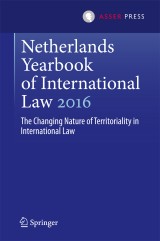Details

Netherlands Yearbook of International Law 2016
The Changing Nature of Territoriality in International LawNetherlands Yearbook of International Law, Band 47
|
CHF 236.00 |
|
| Verlag: | T.M.C. Asser Press |
| Format: | |
| Veröffentl.: | 13.12.2017 |
| ISBN/EAN: | 9789462652071 |
| Sprache: | englisch |
Dieses eBook enthält ein Wasserzeichen.
Beschreibungen
<p>International law holds a paradoxical position with territory. Most rules of international law are traditionally based on the notion of State territory, and territoriality still significantly shapes our contemporary legal system. At the same time, new developments have challenged territory as the main organising principle in international relations. Three trends in particular have affected the role of territoriality in international law: the move towards functional regimes, the rise of cosmopolitan projects claiming to transgress state boundaries, and the development of technologies resulting in the need to address intangible, non-territorial, phenomena. Yet, notwithstanding some profound changes, it remains impossible to think of international law without a territorial locus. If international law is undergoing changes, this implies a reconfiguration of territory, but not a move beyond it.</p><p><i>The Netherlands Yearbook of International Law</i> was first published in 1970. It offers a forum for the publication of scholarly articles of a conceptual nature in a varying thematic area of public international law.</p><p></p><p></p>
The Changing Nature of Territoriality in International Law.- The Paradoxical Place of Territory in International Law.- A State Without Territory – Science Fiction or Reality?.- Territory in The Law of Jurisdiction: Imagining Alternatives.- Cartographies of the Present: ‘Contingent Sovereignty’ and Territorial Integrity.- Data Territories: Changing Architectures of Association in International Law.- ‘Spoofed Presence Does Not Suffice’: On Territoriality in the Tallinn Manual.- Cybercrime, Evidence and Territoriality: Issues and Options.- Reconfiguring Territoriality in International Economic Law.- Extraterritorial Obligations and the Obligation to Protect.- Citizenship at Home and Across Borders .- Territoriality and Asylum Law: The Use of Territorial Jurisdiction to Circumvent Legal Obligations and Human Rights Law Responses.- Schrödinger’s Cake? Territorial Truths for Post-Brexit Britain.- Dutch Practice in International Law.- The Dutch Contribution to the Armed Coalition against ISIS.- The Dutch Referendum on the EU-Ukraine Association Agreement: Legal Implications and Solutions.- The Netherlands: A Tax Haven?.- Recent Developments Regarding the Direct and Indirect Application of Treaties by Dutch Courts: Fresh Approaches to Self-Executing, Non-Self-Executing and Non-Binding International Law.- Table of Cases.- Index.
<p>International law holds a paradoxical position with territory. Most rules of international law are traditionally based on the notion of State territory, and territoriality still significantly shapes our contemporary legal system. At the same time, new developments have challenged territory as the main organising principle in international relations. Three trends in particular have affected the role of territoriality in international law: the move towards functional regimes, the rise of cosmopolitan projects claiming to transgress state boundaries, and the development of technologies resulting in the need to address intangible, non-territorial, phenomena. Yet, notwithstanding some profound changes, it remains impossible to think of international law without a territorial locus. If international law is undergoing changes, this implies a reconfiguration of territory, but not a move beyond it.</p><p><i>The Netherlands Yearbook of International Law</i> was first published in 1970. It offers a forum for the publication of scholarly articles of a conceptual nature in a varying thematic area of public international law.</p><p></p><p></p>
Unique in-depth analysis of different aspects of the evolving relationship between territory and international law Discusses how the development of technologies resulting in intangible phenomena affects our understanding of territory Discusses the notion of territoriality within specific sub-fields of international law (e.g., international economic law, human rights law, refugee law, law of international military operations) Includes contributions analyzing Dutch practice in international law and geared towards an international (non-Dutch speaking) audience
<div>Unique in-depth analysis of different aspects of the evolving relationship between territory and international law</div><div><br/></div><div>Discusses how the development of technologies resulting in intangible phenomena affects our understanding of territory</div><div><br/></div><div>Discusses the notion of territoriality within specific sub-fields of international law (e.g., international economic law, human rights law, refugee law, law of international military operations)</div><div><br/></div><div>Includes contributions analyzing Dutch practice in international law and geared towards an international (non-Dutch speaking) audience</div>
Diese Produkte könnten Sie auch interessieren:

Spreading Democracy and the Rule of Law?

von: Wojciech Sadurski, Adam Czarnota, Martin Krygier

CHF 177.00















